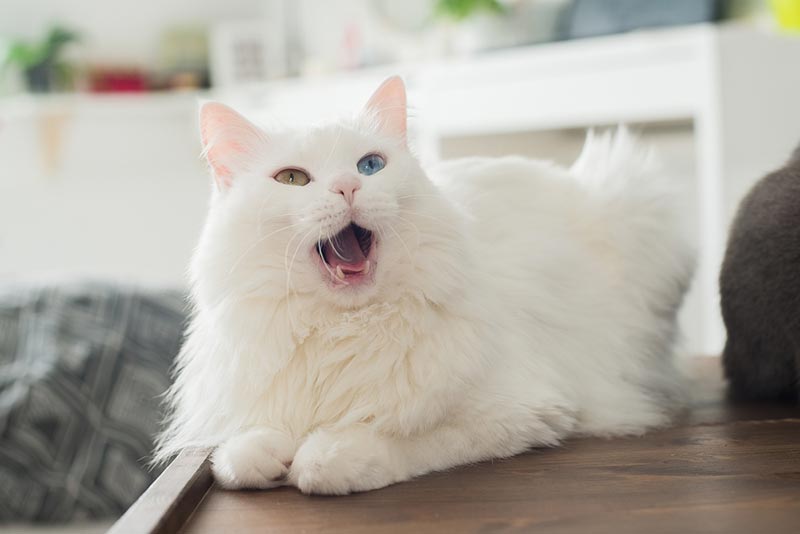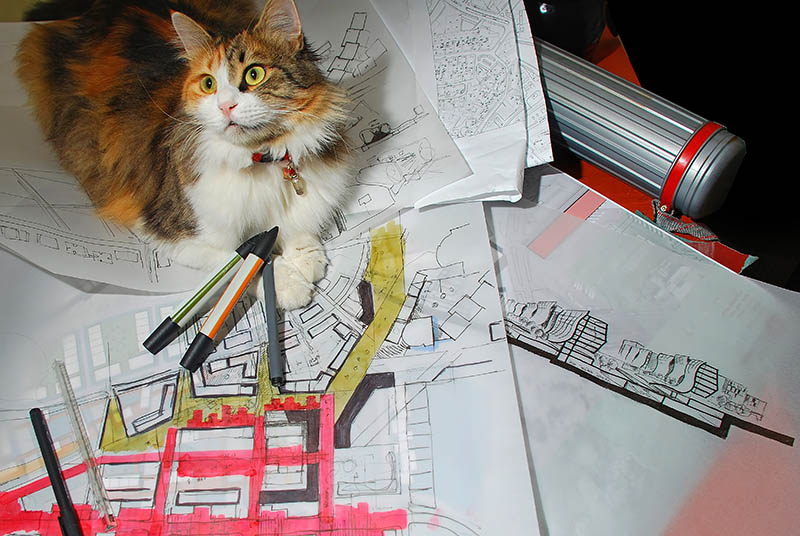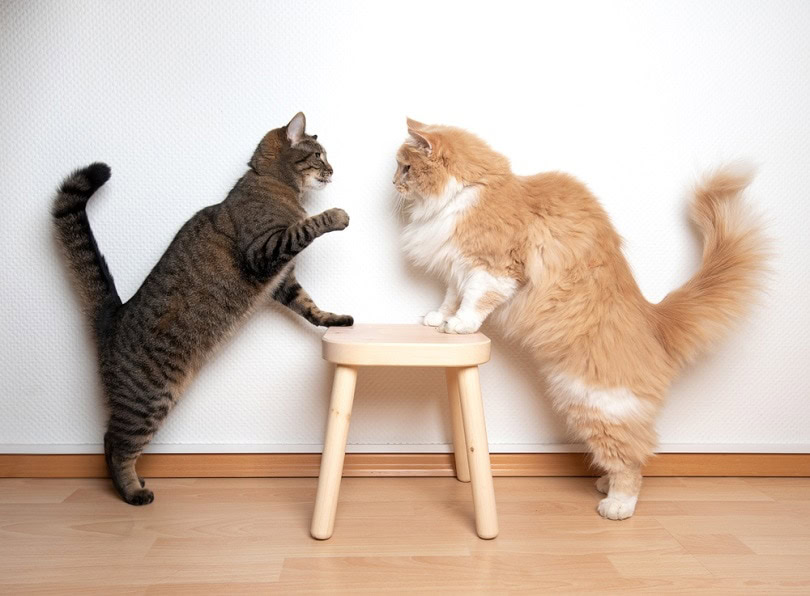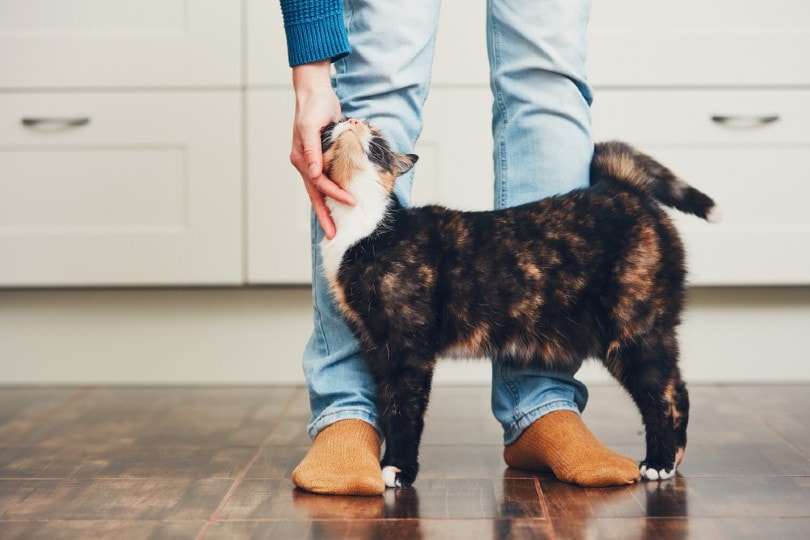Cats tend to meow mostly when they are around humans, but does this mean that they only meow at humans? A cat will meow a lot toward their owner, but adult cats do not normally meow at each other to communicate.
During lactation, a mother cat can meow at her kittens, and the kittens also meow to their mom. In this article, we get to learn why cats mostly meow at humans. It’s essential to understand this as you create a greater bond with your feline friend.

Why Do Cats Meow at Humans?
Since kittenhood, cats learn that meowing is their way of communicating certain needs to their food provider and caretaker, and it is very easy for this behavior to be extrapolated to their owners. As owners respond to the meows, cats learn this is an effective way to get what they want. Once that “language” is established, the meow can be translated into lots of things, including the following.
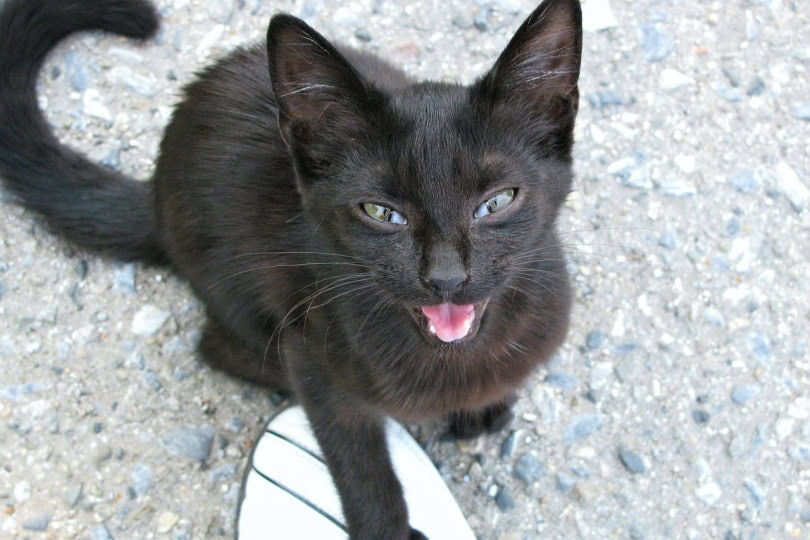
A Simple Greeting
Perhaps it’s early in the morning, and you’ve just come downstairs. It’s pretty common for your cat to run to you with a loud meow. That’s their way of saying ‘good morning.’
Signaling Feeding Time
A continuous meow from your cat can mean ‘it’s time for breakfast.’ Cats learn that using the meow along with a piercing look is the best way to communicate with their owners when hungry. A meow can also be a prompt to give them some treats.
Seeking Affection
A meow can even be a plea for help or them asking you to pick them up. But, it’s up to you as the feline parent to deduce what the meow means. If they love belly and back rubs, that can be it.
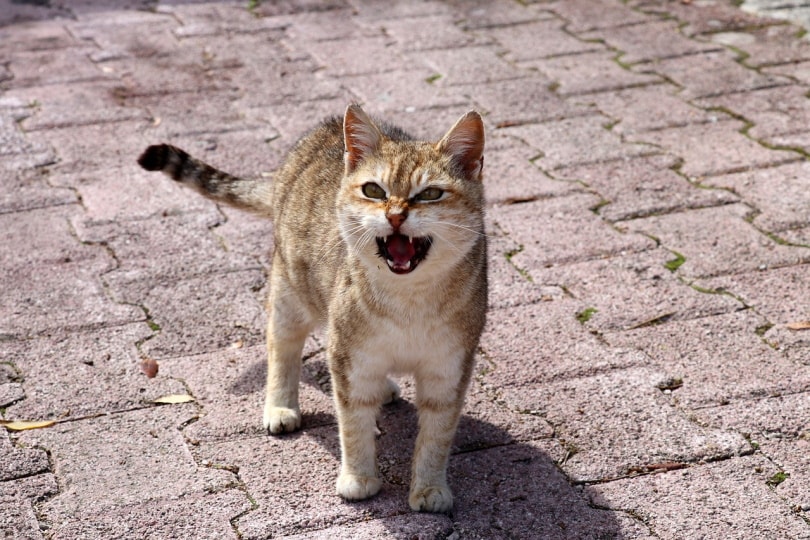
Wanting to Go Outside
If your cat is into a routine, you can assess what time it is and what they need. A meow while scratching at the door means it’s time to go outside and play. The cat may have learned that meowing while standing by the door is the best way to beg for a little outing.
To Be Let Back Inside
When they’re outside and can’t get back inside, they meow at the top of their voice to get your attention.
Cry for Help
A meow from an older cat can be a cry for help. They tend to lose focus and cognitive function, making them feel scared and want some immediate comfort. For kittens, it can be a cry looking for their mother or you if you’re the primary caregiver.

Do Cats Meow at Their Kittens?
Although cats mostly meow at humans, they also meow a lot at their kittens. Try and observe a mother cat and her kittens. There will be lots of licking and meowing as they continue to bond as a family.
Moms meow to their kittens for different reasons. Remember, newborn kittens are blind and a little deaf when small. A mom’s meow is to help them find their way to her and some much-needed milk. She can also be trying to find an older kitten that’s lost or call them over if they wander too far.
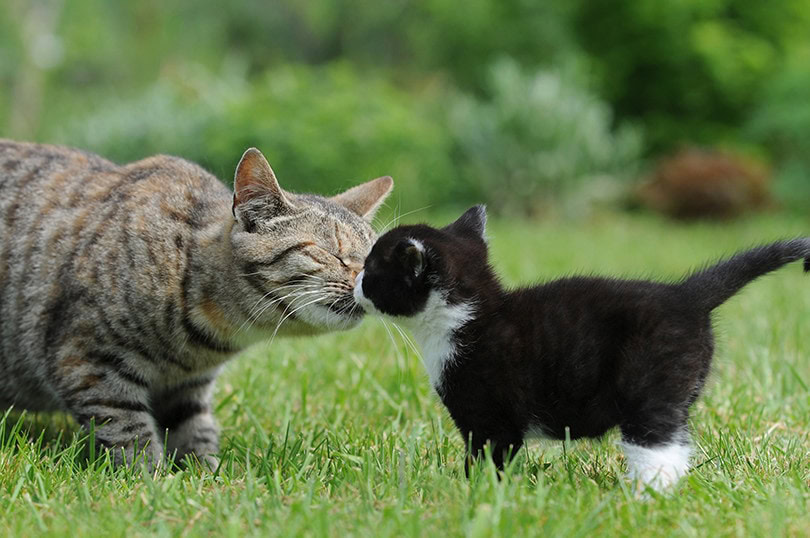
Do Cats Meow to Attract a Mate?
A female cat that isn’t spayed will, at some point, go into heat. This means they have to search for a male to reproduce. While searching for a mate, you notice your feline friend vocalizes a lot.
However, this is more of a cry than a gentle meow and is called a mating cry or mate-calling vocalization. The mating cry lets the male cats in the area know she is in heat and ready to mate. The more she searches for a mate, the louder the cry becomes.
There’s nothing gentle about a mating cry, so it’s quite easy to distinguish it from a meow. Most of the mating calls will happen at night when cats tend to be more active. This characteristic is quite common in all felines, including wild bobcats, lions, etc.
Do Sick Cats Meow?
As mentioned earlier, a cat’s meow is its way of communicating with you. It can mean many things, and most of the time, it’s an energetic and audible meow. But, in other cases, it’s a way to alert you to a problem.
Maybe you come into a room and hear a small meow from the corner. Your cat is lying on the floor and can only make a little noise. That meow isn’t as vibrant as the other times. This may be their attempt to indicate that your cat isn’t feeling well, or perhaps they have an injury.
The moment they see you, this meow is continuous to say, ‘please help me.’ In such a case, it’s best to jump into action. Gently inspect your cat to see if they have any injuries, and be keen to check their temperature. Then, proceed to take them to the vet for an immediate checkup.
- Loss of appetite
- Lack of movement
- Lack of vibrancy
- Hiding in certain spots
- Mood change
- Diarrhea
- Vomiting
Any of this can accompany a slow meow from your cat. No one understands your cats as well as you do, so you can always tell when something is wrong. You should consult a vet if you find your cat is displaying any of the above.

Is It Possible to Help Your Cat Meow Less?
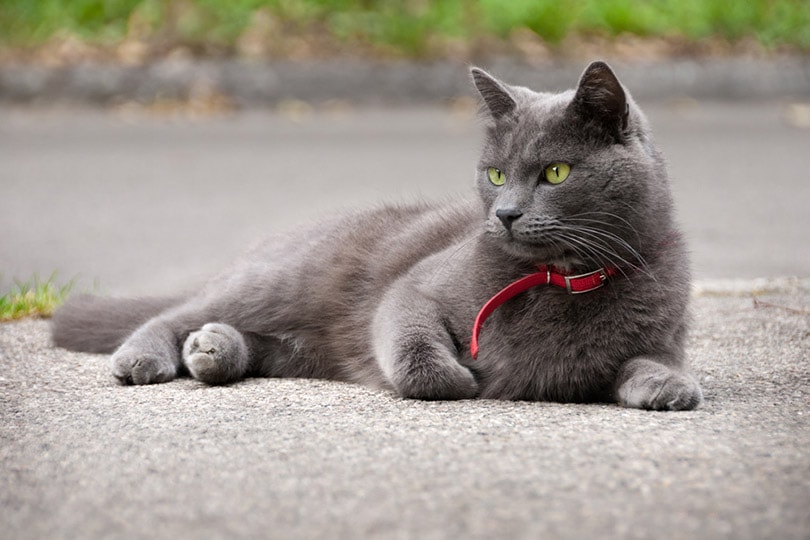
A cat’s meow is so lovely and can be a sign of affection. However, it becomes less charming if it’s constant. You want some peace, but your feline friend won’t stop crying out to you. What do you do? Are there ways to make a cat less vocal?
First, before you follow any guides to help your cat stop the excessive meows, it’s better to get to the bottom of the matter. Why is your cat so vocal? Is there something wrong, or is it a behavior they’ve been learning?
Understanding the cause can be crucial, especially if the excessive vocalization is because your cat is ill. They may be trying to communicate the fact that something is wrong. So, perhaps start with a physical examination or take them to a vet to rule out any injury or illness.
After you’re sure the excessive meowing isn’t because of injury or illness, you can try the methods below to hopefully reduce your cat’s meowing.

How to Make Your Cat Meow Less in 5 Steps
1. Reduce Attention and Affection Until Your Cat Is Silent
Excessive meows can be subtle demands to pick them up and pet them. While this is adorable at first, it can grow into a disruptive habit if your cat always meows to get attention. Therefore, the best thing is to teach your cat that they only get attention and affection when they are quiet.
This might take some time for both of you to change your ways, but it’s doable. Always resist the urge to pet them until they’re silent. Keep repeating this, and soon you’ll have a quieter household.
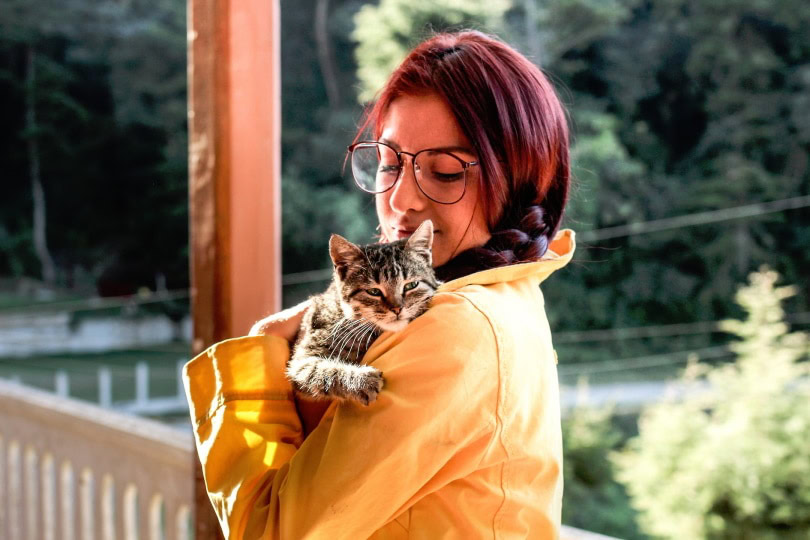
2. Get a Cat Sitter
A lonely cat will tend to be clingy and meow out a lot. Perhaps they spend all day alone inside the house and want a chance to interact with others outside. One way to help them not be too lovely is to get a cat sitter.
You can hire professional cat sitters to spend a few hours a day with your feline friend. This helps your cat not be too lonely. However, if this is the plan, you must ensure the cat sitter also remains consistent about not reinforcing your cat meowing for attention and rather reinforcing your cat with attention, cuddles, and play when they are calm and quiet.
3. Try a Different Feeding Routine
Does your cat meow bloody murder when it’s time to feed them? If that’s the case, you have to nip that behavior in the bud by stopping it. Stop feeding them each time they meow; when they keep quiet, compliment them and continue adding their food.
Your cat can turn into a well-behaved feline friend after some time. But, you have to be firm. If you falter, they can go back to their old ways of loud meows demanding food.
Soon your cat will only be saying good morning, and then they sit silently waiting for their food.
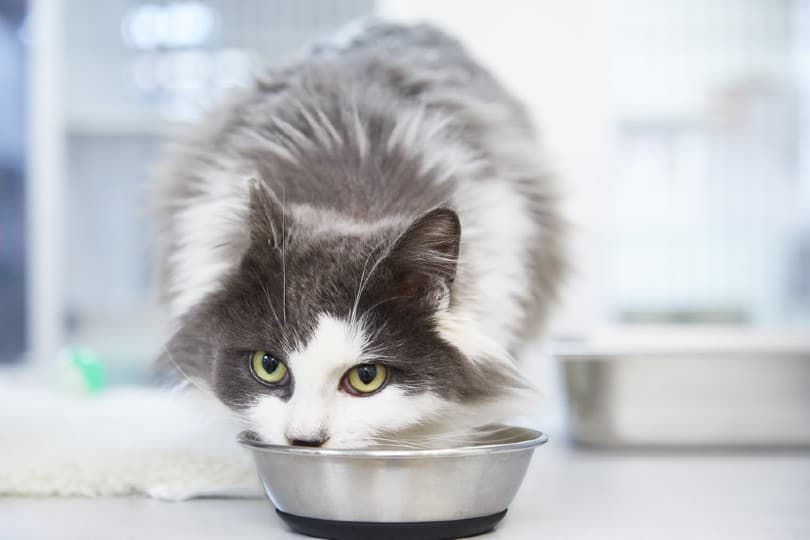
4. Avoid Morning Greetings
It’s worth noting that an early morning greeting is probably always going to be there. If you wish to reduce the morning greeting meows, you can practice waking up and slipping out without giving attention to your cat until they are quiet.
5. Spay Your Cat
Some first-time female cat owners confuse mating calls with meows. You will soon learn that the loud vocalization is unbearable. They’ll make sure to wake you up with mating cries each night.
The worst part is that your indoor cat will try to escape searching for a mate and if she succeeds and comes back home, she’ll be pregnant. The best way to avoid this happening is to spay her. Take her to the vet the day you adopt her if she is an adult or after she’s grown if you adopt her as a kitten; make sure she has the procedure done before it’s too late.


Conclusion
A cat’s meow is its way of communicating with the owner. They can meow as a form of greeting, saying they need something or a sign something is wrong. However, as seen, cats do not only meow at humans. They can also meow to their mom as the kittens as their mom meows at them to guide them.
While this is usually a learned behavior, to get what they want, it may indicate an issue as well. So it is best to try and assess the meow, especially if it’s excessive. There are ways you can teach your cat to become less vocal. But only do so after you are sure the cat isn’t trying to communicate that something is wrong.
Featured Image Credit: Helen Bloom, Shutterstock
Contents
- Why Do Cats Meow at Humans?
- A Simple Greeting
- Signaling Feeding Time
- Seeking Affection
- Wanting to Go Outside
- To Be Let Back Inside
- Cry for Help
- Do Cats Meow at Their Kittens?
- Do Cats Meow to Attract a Mate?
- Do Sick Cats Meow?
- Is It Possible to Help Your Cat Meow Less?
- How to Make Your Cat Meow Less in 5 Steps
- 1. Reduce Attention and Affection Until Your Cat Is Silent
- 2. Get a Cat Sitter
- 3. Try a Different Feeding Routine
- 4. Avoid Morning Greetings
- 5. Spay Your Cat
- Conclusion
